Unit 1 How can we become good learners. Section B 2a-2e 课件(共26张PPT)
文档属性
| 名称 | Unit 1 How can we become good learners. Section B 2a-2e 课件(共26张PPT) |
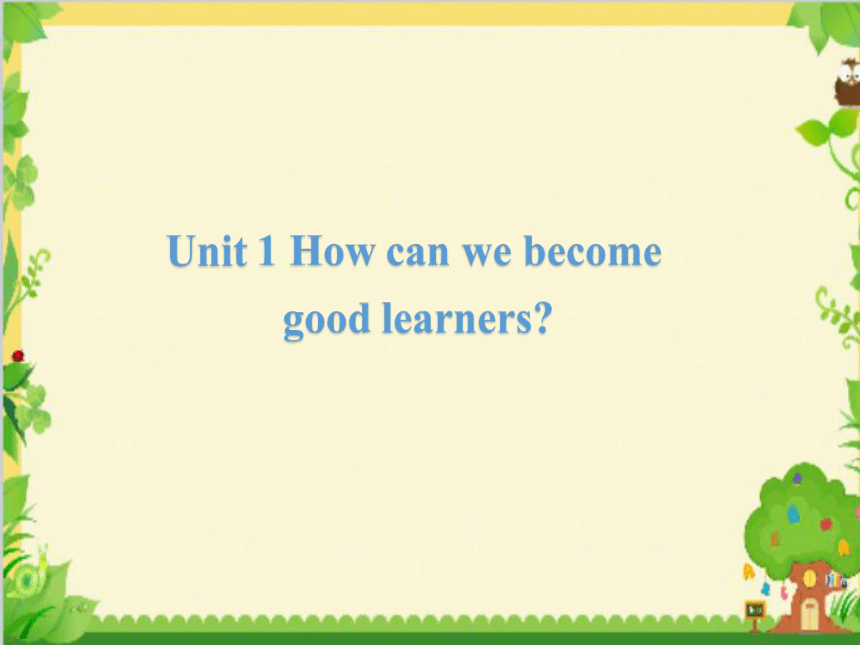
|
|
| 格式 | zip | ||
| 文件大小 | 775.4KB | ||
| 资源类型 | 教案 | ||
| 版本资源 | 人教新目标(Go for it)版 | ||
| 科目 | 英语 | ||
| 更新时间 | 2021-07-25 00:00:00 | ||
图片预览

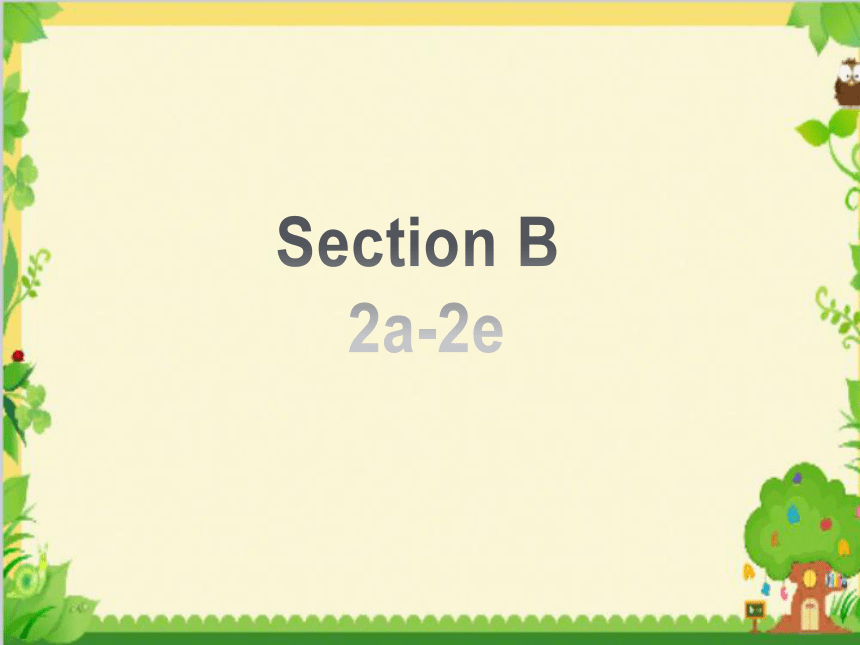
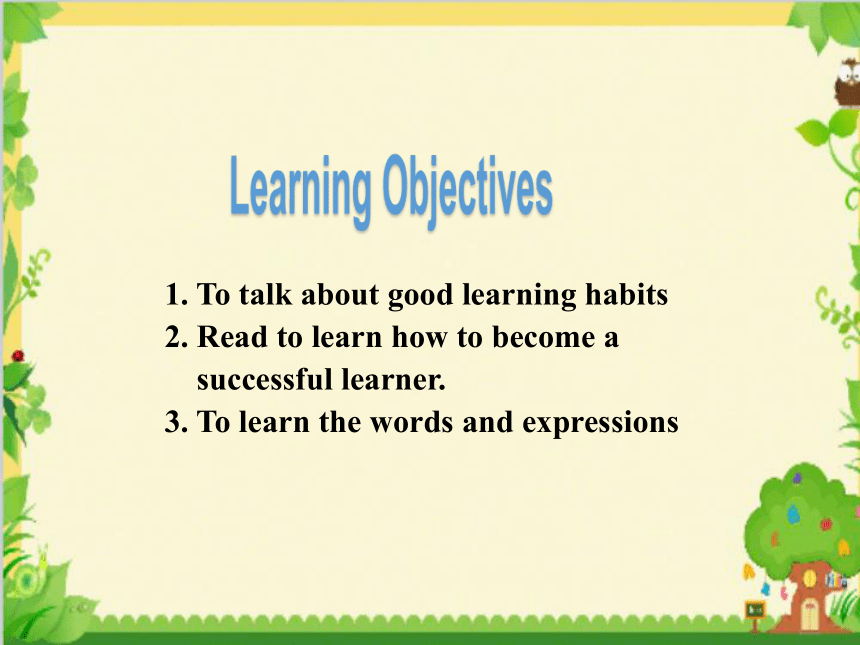
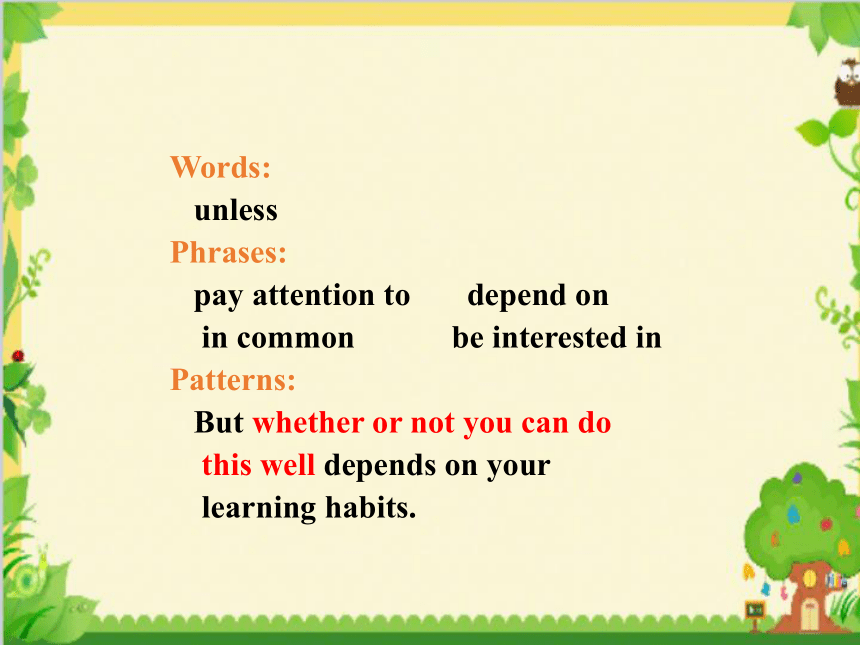
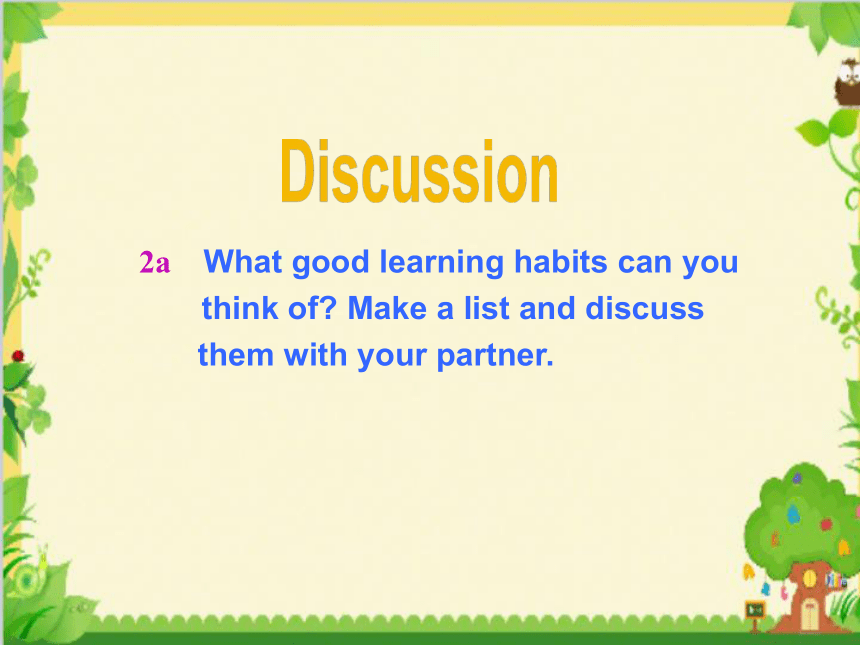
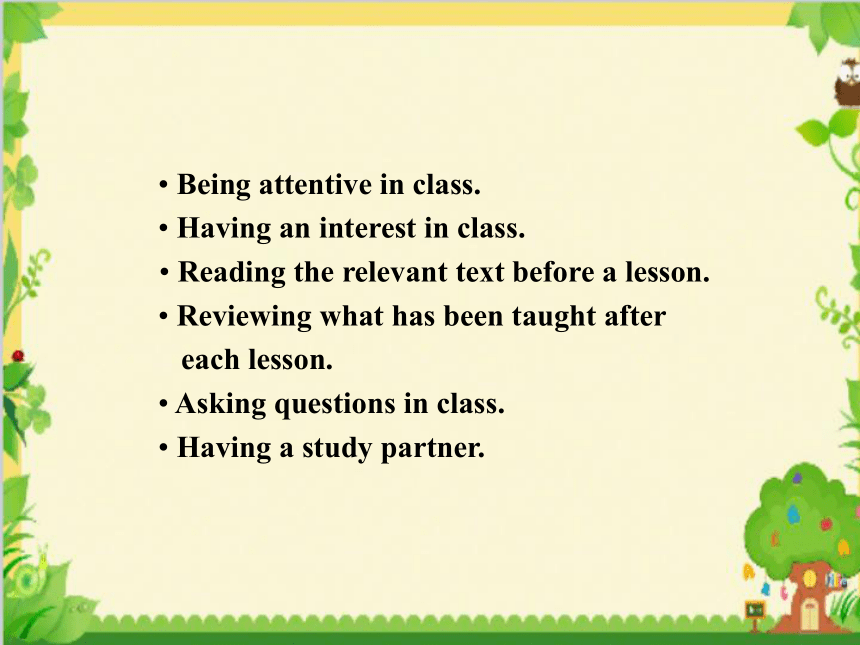
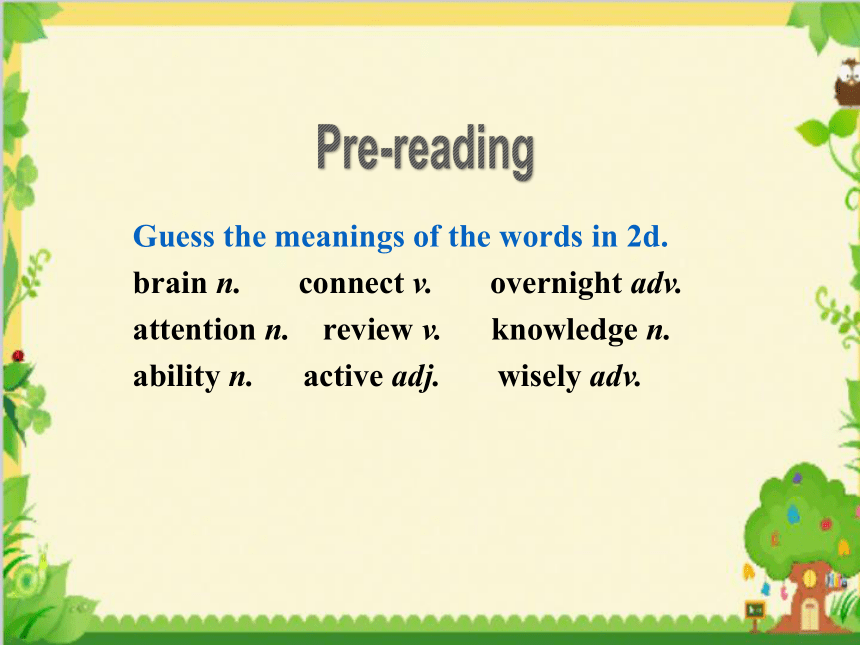
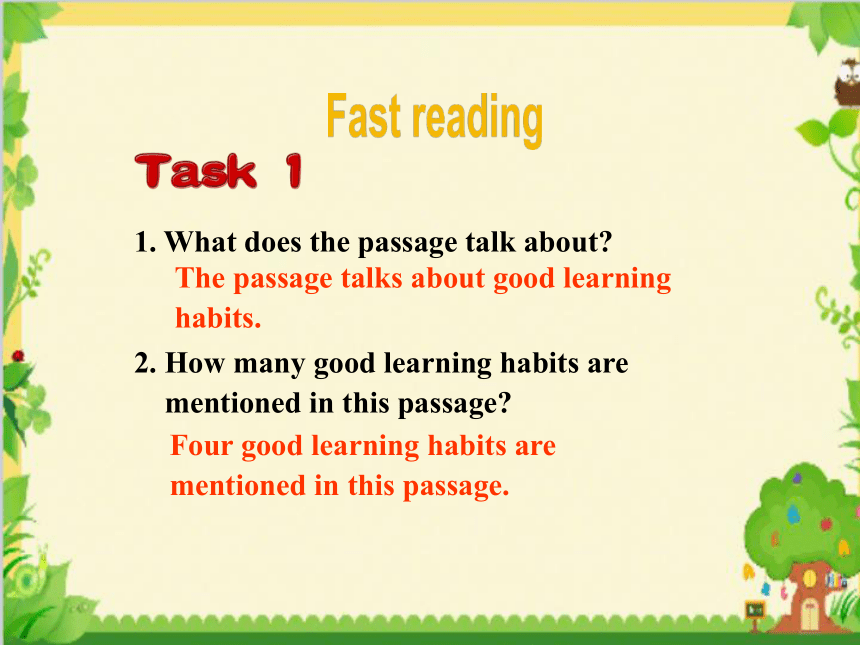
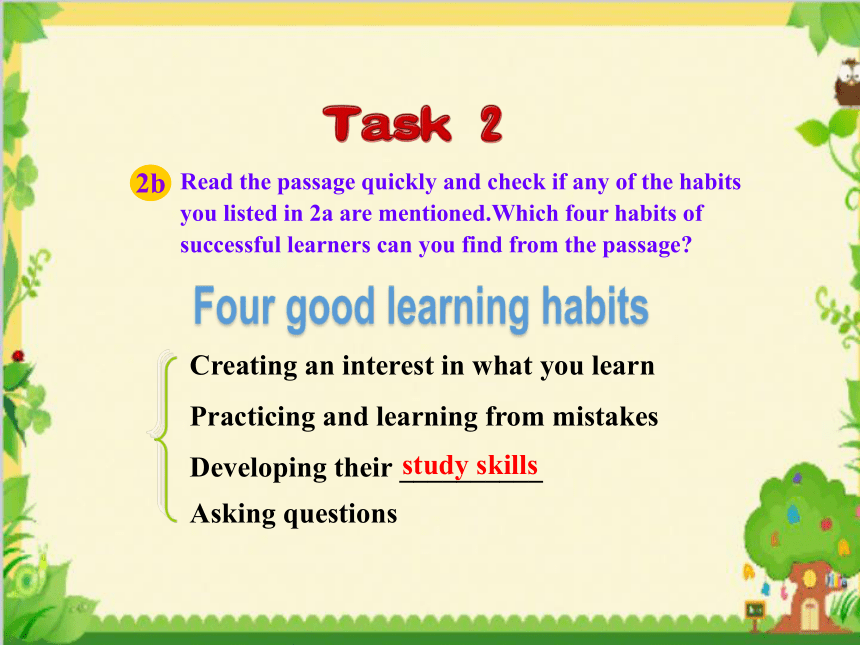
文档简介
(共26张PPT)
Unit
1
How
can
we
become
good
learners?
Section
B
2a-2e
Learning
Objectives
1.
To
talk
about
good
learning
habits
2.
Read
to
learn
how
to
become
a
successful
learner.
3.
To
learn
the
words
and
expressions
Words:
unless
Phrases:
pay
attention
to
depend
on
in
common
be
interested
in
Patterns:
But
whether
or
not
you
can
do
this
well
depends
on
your
learning
habits.
2a
What
good
learning
habits
can
you
think
of?
Make
a
list
and
discuss
them
with
your
partner.
Discussion
Being
attentive
in
class.
Having
an
interest
in
class.
Reading
the
relevant
text
before
a
lesson.
Reviewing
what
has
been
taught
after
each
lesson.
Asking
questions
in
class.
Having
a
study
partner.
Guess
the
meanings
of
the
words
in
2d.
brain
n.
connect
v.
overnight
adv.
attention
n.
review
v.
knowledge
n.
ability
n.
active
adj.
wisely
adv.
Pre-reading
1.
What
does
the
passage
talk
about?
2.
How
many
good
learning
habits
are
mentioned
in
this
passage?
The
passage
talks
about
good
learning
habits.
Four
good
learning
habits
are
mentioned
in
this
passage.
Fast
reading
Four
good
learning
habits
Creating
an
interest
in
what
you
learn
Practicing
and
learning
from
mistakes
Developing
their
__________
Asking
questions
study
skills
Read
the
passage
quickly
and
check
if
any
of
the
habits
you
listed
in
2a
are
mentioned.Which
four
habits
of
successful
learners
can
you
find
from
the
passage?
2b
1.
Does
the
writer
think
that
everyone
is
born
with
the
ability
to
learn
well?
Do
you
agree?
Why
or
why
not?
Read
the
passage
again
and
answer
the
questions.
No,
he
doesn’t.
The
writer
thinks
everyone
is
born
with
the
ability
to
learn.
But
whether
or
not
you
can
do
this
well
depends
on
your
learning
habits.
2c
2.
Why
is
it
a
good
idea
to
connect
something
you
need
to
learn
with
something
you
are
interested
in?
Studies
show
that
if
you
are
interested
in
something,
your
brain
is
more
active
and
it
is
also
easier
for
you
to
pay
attention
to
it
for
a
long
time.
You
will
also
not
get
bored.
3.
What
do
the
sayings
“Use
it
or
lose
it”
and
“Practice
makes
perfect”
mean?
Do
you
agree
with
them?
Use
it
or
lose
it:
If
you
stop
doing
something,
you
will
forget
how
to
do
it.
Practice
makes
perfect:
If
you
do
something
again
and
again,
you
will
become
very
good
at
it.
4.
Do
good
learners
learn
from
mistakes,
or
are
they
afraid
of
making
mistakes?
Yes.
Good
learners
learn
from
their
mistakes,
and
they
are
not
afraid
of
making
mistakes.
5.
What
study
skills
does
the
writer
talk
about?
Do
you
have
those
study
skills?
Take
notes
by
writing
down
key
words
or
by
drawing
mind
maps.
Look
for
ways
to
review
what
has
been
learnt.
For
example,
read
the
notes
every
day
or
explain
the
information
to
another
student.
6.
Do
you
agree
that
learning
is
a
lifelong
journey?
Why
or
why
not?
Yes.
Learning
is
a
lifelong
journey
because
every
day
brings
something
new.
2e
Do
you
think
you
are
a
good
learner?
What
learning
habits
do
you
think
are
useful?
Discuss
with
your
group
and
share
your
ideas
with
the
class.
A:
I
think
another
way
to
become
a
successful
learner
is
by
trying
to
think
about
the
same
thing
in
different
ways.
B:
I
agree.
I
believe
that…
Some
sentence
starters
for
giving
opinions:
I
think…
I
feel…
I
believe…
It
is
important
to…
How
to
give
my
opinion?
Some
sentence
starters
for
giving
opinions:
I
think…
I
feel…
I
believe…
It
is
important
to…
1.
注意,关注
2.
把……和……联系起来
3.
天生具有……
4.
取决于
5.
即使
6.
对……感兴趣
7.
有共同之处
8.
向……学习
9.
熟能生巧
pay
attention
to
connect…with…
be
born
with…
depend
on
even
if
be
interested
in
have
sth.
in
common
learn
from
Practice
makes
perfect.
Summary
Four
habits
of
successful
learners:
(1)
Creating
an
interest
in
what
they
learn
(2)
Practicing
and
learning
from
mistakes
(3)
Developing
their
study
skills
(4)
Asking
questions
Ⅰ.
根据句意,用方框中所给单词的适当形式填空。
review,
increase,
create,
pronounce,
knowledge,
brain,
partner,
active,
wise,
lifelong
1.
Enough
sleep
can
make
sure
our
________
work
better.
2.
My
problem
with
English
is
that
I
can’t
___________
some
words
correctly.
3.
Bob
gave
me
some
advice
on
how
__________
my
reading
speed.
brains
pronounce
to
increase
review,
increase,
create,
pronounce,
knowledge,
brain,
partner,
active,
wise,
lifelong
4.
Mr.
Brown
is
usually
very
quiet,
but
he
was
________
at
the
party
yesterday.
5.
Rick,
read
the
following
dialogues
and
then
practice
them
with
your
________.
6.
It’s
very
important
for
us
to
choose
our
friends
________.
7.
Try
to
________
an
interest
in
what
you
learn.
active
partner
wisely
create
review,
increase,
create,
pronounce,
knowledge,
brain,
partner,
active,
wise,
lifelong
8.
The
teacher
said
we
should
________
what
we
learned
before
the
test.
9.
They
can
get
a
lot
of
scientific
__________
from
such
an
interesting
activity.
10.
My
mother
is
my
first
teacher
and
my
________
teacher.
review
knowledge
lifelong
Ⅱ.
根据汉语意思完成英语句子,每空一词。
1.
张老师叫我注意拼写。
Mr.
Zhang
told
me
to
___
_______
__
my
spelling.
2.
这条铁路把北京和上海连接了起来。
The
railway
_______
Beijing
____
Shanghai.
3.
我们不确定下周是否去宿营,这取决于天
气情况。
We’re
not
sure
if
we’ll
go
camping
next
week.
It
_______
__
the
weather.
pay
attention
to
connects
with
depends
on
4.
明天上午苏珊将和我们分享她的学习习
惯。
Susan
will
share
her
________
______
with
us
tomorrow
morning.
5.
这两种文化有很多相同之处。
The
two
cultures
____
a
lot
__
________.
6.
熟能生巧。为了学好英语,你需要大量的
练习。
________
______
________.
To
learn
English
well,
you
need
a
lot
of
practice.
learning
habits
have
in
common
Practice
makes
perfect
7.
昨天卡萝尔要求给她时间考虑一下那件
事。
Yesterday
Carol
asked
for
time
to
_____
______
it.
8.
劳拉天生具有跳舞的能力。
Laura
__
____
____
the
ability
to
dance.
think
about
is
born
with
Write
a
sentence
for
each
word
in
the
box.
brain
n.
connect
v.
overnight
adv.
attention
n.
review
v.
knowledge
n.
ability
n.
active
adj.
wisely
adv.
Unit
1
How
can
we
become
good
learners?
Section
B
2a-2e
Learning
Objectives
1.
To
talk
about
good
learning
habits
2.
Read
to
learn
how
to
become
a
successful
learner.
3.
To
learn
the
words
and
expressions
Words:
unless
Phrases:
pay
attention
to
depend
on
in
common
be
interested
in
Patterns:
But
whether
or
not
you
can
do
this
well
depends
on
your
learning
habits.
2a
What
good
learning
habits
can
you
think
of?
Make
a
list
and
discuss
them
with
your
partner.
Discussion
Being
attentive
in
class.
Having
an
interest
in
class.
Reading
the
relevant
text
before
a
lesson.
Reviewing
what
has
been
taught
after
each
lesson.
Asking
questions
in
class.
Having
a
study
partner.
Guess
the
meanings
of
the
words
in
2d.
brain
n.
connect
v.
overnight
adv.
attention
n.
review
v.
knowledge
n.
ability
n.
active
adj.
wisely
adv.
Pre-reading
1.
What
does
the
passage
talk
about?
2.
How
many
good
learning
habits
are
mentioned
in
this
passage?
The
passage
talks
about
good
learning
habits.
Four
good
learning
habits
are
mentioned
in
this
passage.
Fast
reading
Four
good
learning
habits
Creating
an
interest
in
what
you
learn
Practicing
and
learning
from
mistakes
Developing
their
__________
Asking
questions
study
skills
Read
the
passage
quickly
and
check
if
any
of
the
habits
you
listed
in
2a
are
mentioned.Which
four
habits
of
successful
learners
can
you
find
from
the
passage?
2b
1.
Does
the
writer
think
that
everyone
is
born
with
the
ability
to
learn
well?
Do
you
agree?
Why
or
why
not?
Read
the
passage
again
and
answer
the
questions.
No,
he
doesn’t.
The
writer
thinks
everyone
is
born
with
the
ability
to
learn.
But
whether
or
not
you
can
do
this
well
depends
on
your
learning
habits.
2c
2.
Why
is
it
a
good
idea
to
connect
something
you
need
to
learn
with
something
you
are
interested
in?
Studies
show
that
if
you
are
interested
in
something,
your
brain
is
more
active
and
it
is
also
easier
for
you
to
pay
attention
to
it
for
a
long
time.
You
will
also
not
get
bored.
3.
What
do
the
sayings
“Use
it
or
lose
it”
and
“Practice
makes
perfect”
mean?
Do
you
agree
with
them?
Use
it
or
lose
it:
If
you
stop
doing
something,
you
will
forget
how
to
do
it.
Practice
makes
perfect:
If
you
do
something
again
and
again,
you
will
become
very
good
at
it.
4.
Do
good
learners
learn
from
mistakes,
or
are
they
afraid
of
making
mistakes?
Yes.
Good
learners
learn
from
their
mistakes,
and
they
are
not
afraid
of
making
mistakes.
5.
What
study
skills
does
the
writer
talk
about?
Do
you
have
those
study
skills?
Take
notes
by
writing
down
key
words
or
by
drawing
mind
maps.
Look
for
ways
to
review
what
has
been
learnt.
For
example,
read
the
notes
every
day
or
explain
the
information
to
another
student.
6.
Do
you
agree
that
learning
is
a
lifelong
journey?
Why
or
why
not?
Yes.
Learning
is
a
lifelong
journey
because
every
day
brings
something
new.
2e
Do
you
think
you
are
a
good
learner?
What
learning
habits
do
you
think
are
useful?
Discuss
with
your
group
and
share
your
ideas
with
the
class.
A:
I
think
another
way
to
become
a
successful
learner
is
by
trying
to
think
about
the
same
thing
in
different
ways.
B:
I
agree.
I
believe
that…
Some
sentence
starters
for
giving
opinions:
I
think…
I
feel…
I
believe…
It
is
important
to…
How
to
give
my
opinion?
Some
sentence
starters
for
giving
opinions:
I
think…
I
feel…
I
believe…
It
is
important
to…
1.
注意,关注
2.
把……和……联系起来
3.
天生具有……
4.
取决于
5.
即使
6.
对……感兴趣
7.
有共同之处
8.
向……学习
9.
熟能生巧
pay
attention
to
connect…with…
be
born
with…
depend
on
even
if
be
interested
in
have
sth.
in
common
learn
from
Practice
makes
perfect.
Summary
Four
habits
of
successful
learners:
(1)
Creating
an
interest
in
what
they
learn
(2)
Practicing
and
learning
from
mistakes
(3)
Developing
their
study
skills
(4)
Asking
questions
Ⅰ.
根据句意,用方框中所给单词的适当形式填空。
review,
increase,
create,
pronounce,
knowledge,
brain,
partner,
active,
wise,
lifelong
1.
Enough
sleep
can
make
sure
our
________
work
better.
2.
My
problem
with
English
is
that
I
can’t
___________
some
words
correctly.
3.
Bob
gave
me
some
advice
on
how
__________
my
reading
speed.
brains
pronounce
to
increase
review,
increase,
create,
pronounce,
knowledge,
brain,
partner,
active,
wise,
lifelong
4.
Mr.
Brown
is
usually
very
quiet,
but
he
was
________
at
the
party
yesterday.
5.
Rick,
read
the
following
dialogues
and
then
practice
them
with
your
________.
6.
It’s
very
important
for
us
to
choose
our
friends
________.
7.
Try
to
________
an
interest
in
what
you
learn.
active
partner
wisely
create
review,
increase,
create,
pronounce,
knowledge,
brain,
partner,
active,
wise,
lifelong
8.
The
teacher
said
we
should
________
what
we
learned
before
the
test.
9.
They
can
get
a
lot
of
scientific
__________
from
such
an
interesting
activity.
10.
My
mother
is
my
first
teacher
and
my
________
teacher.
review
knowledge
lifelong
Ⅱ.
根据汉语意思完成英语句子,每空一词。
1.
张老师叫我注意拼写。
Mr.
Zhang
told
me
to
___
_______
__
my
spelling.
2.
这条铁路把北京和上海连接了起来。
The
railway
_______
Beijing
____
Shanghai.
3.
我们不确定下周是否去宿营,这取决于天
气情况。
We’re
not
sure
if
we’ll
go
camping
next
week.
It
_______
__
the
weather.
pay
attention
to
connects
with
depends
on
4.
明天上午苏珊将和我们分享她的学习习
惯。
Susan
will
share
her
________
______
with
us
tomorrow
morning.
5.
这两种文化有很多相同之处。
The
two
cultures
____
a
lot
__
________.
6.
熟能生巧。为了学好英语,你需要大量的
练习。
________
______
________.
To
learn
English
well,
you
need
a
lot
of
practice.
learning
habits
have
in
common
Practice
makes
perfect
7.
昨天卡萝尔要求给她时间考虑一下那件
事。
Yesterday
Carol
asked
for
time
to
_____
______
it.
8.
劳拉天生具有跳舞的能力。
Laura
__
____
____
the
ability
to
dance.
think
about
is
born
with
Write
a
sentence
for
each
word
in
the
box.
brain
n.
connect
v.
overnight
adv.
attention
n.
review
v.
knowledge
n.
ability
n.
active
adj.
wisely
adv.
同课章节目录
- Unit 1 How can we become good learners.
- Section A
- Section B
- Unit 2 I think that mooncakes are delicious!
- Section A
- Section B
- Unit 3 Could you please tell me where the restroom
- Section A
- Section B
- Unit 4 I used to be afraid of the dark.
- Section A
- Section B
- Unit 5 What are the shirts made of?
- Section A
- Section B
- Review of Units 1-5
- Unit 6 When was it invented?
- Section A
- Section B
- Unit 7 Teenagers should be allowed to choose their
- Section A
- Section B
- Unit 8 It must belong to Carla.
- Section A
- Section B
- Unit 9 I like music that I can dance to.
- Section A
- Section B
- Unit 10 You're supposed to shake hands.
- Section A
- Section B
- Review of Units 6-10
- Unit 11 Sad movies make me cry.
- Section A
- Section B
- Unit 12 Life is full of the unexpected
- Section A
- Section B
- Unit 13 We're trying to save the earth!
- Section A
- Section B
- Unit 14 I remember meeting all of you in Grade 7.
- Section A
- Section B
- Review of Units 11-14
